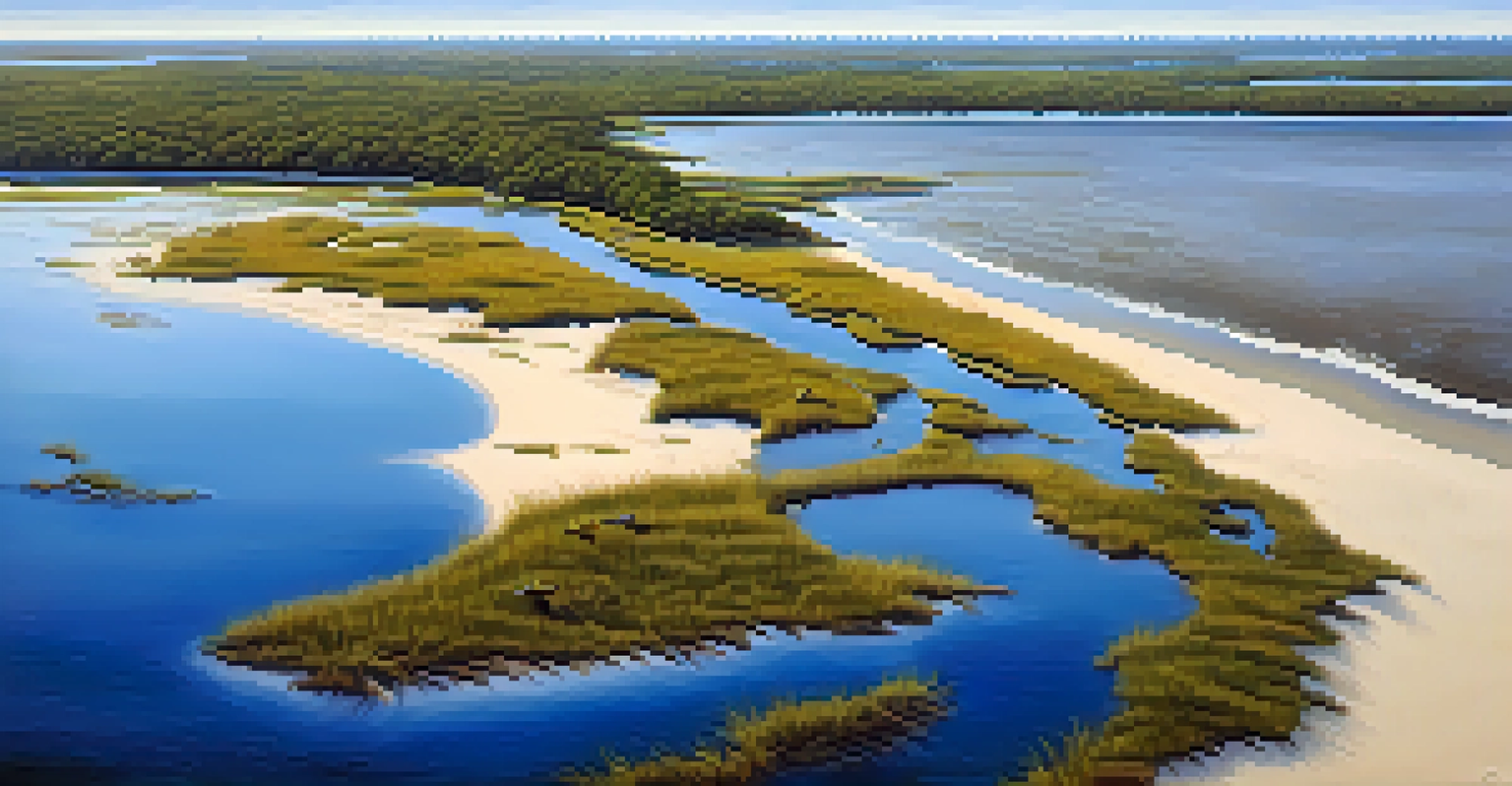Innovative Technologies in Savannah's Environmental Conservation

Smart Sensors Monitoring Savannah's Natural Resources
Savannah is leveraging smart sensor technology to keep a close eye on its natural resources. These sensors collect real-time data on air and water quality, allowing for immediate responses to environmental changes. For instance, when pollution levels spike, city officials can act quickly to mitigate the effects. This proactive approach not only protects local ecosystems but also ensures public health and safety.
The environment is where we all meet; where we all have a mutual interest; it is the one thing all of us share.
By implementing these smart sensors throughout parks and waterways, Savannah can gather valuable insights into its environment. This data helps inform conservation strategies and policy decisions, making them more effective and targeted. Imagine having a digital watchdog that alerts you to potential problems before they escalate—that's what these technologies provide.
Moreover, the integration of smart sensors into everyday conservation efforts fosters community engagement. Residents can access the data and learn about their environment, encouraging them to participate in local conservation initiatives. This creates a collaborative atmosphere where technology and community come together for a healthier Savannah.
Drones Enhancing Wildlife Monitoring and Conservation
Drones are revolutionizing wildlife monitoring in Savannah by providing a bird's-eye view of habitats and populations. These unmanned aerial vehicles can easily access hard-to-reach areas, capturing high-resolution images that help conservationists track animal movements and behaviors. For example, drones can monitor nesting sites along the coast, ensuring that critical habitats remain undisturbed.

Not only do drones save time and resources, but they also enhance data collection accuracy. Traditional methods of tracking wildlife often involve extensive fieldwork, which can be both costly and time-consuming. In contrast, drones can cover large areas in a fraction of the time, making it easier to gather comprehensive data on species diversity and distribution.
Smart Sensors Enhance Conservation
Savannah uses smart sensors to monitor air and water quality, enabling quick responses to environmental changes.
The use of drones also opens up new avenues for public engagement. Educational programs can incorporate drone footage to showcase the beauty of Savannah's wildlife and the importance of conservation efforts. By sharing these aerial views with the community, Savannah fosters a deeper appreciation for its natural surroundings and encourages collective action.
Artificial Intelligence in Environmental Decision-Making
Artificial intelligence (AI) is becoming a valuable tool in Savannah's environmental decision-making processes. By analyzing vast amounts of data, AI can identify trends and predict future environmental impacts, helping city planners make informed decisions. For example, AI can assess the potential effects of new development projects on local ecosystems, guiding sustainable urban growth.
We won't have a society if we destroy the environment.
The integration of AI into environmental conservation means that resources can be allocated more efficiently. Rather than relying on guesswork, city officials can use data-driven insights to prioritize conservation efforts in the areas that need it most. This not only maximizes the impact of their initiatives but also ensures that taxpayer dollars are spent wisely.
Furthermore, AI technology can enhance public awareness campaigns by tailoring messages to specific audiences. By analyzing community data, AI can help create targeted outreach strategies that resonate with residents. This personalized approach fosters a stronger connection between the community and conservation efforts, ultimately leading to greater participation.
Renewable Energy Solutions Supporting Savannah’s Ecosystems
Savannah is embracing renewable energy solutions to power its conservation initiatives sustainably. Solar panels and wind turbines are being installed in strategic locations, providing clean energy that reduces the city's carbon footprint. This shift not only supports local wildlife habitats but also contributes to the global fight against climate change.
By harnessing renewable energy, conservation projects become more self-sufficient. For instance, solar-powered water pumps can efficiently manage irrigation in parks, ensuring that green spaces thrive without depleting natural resources. This innovative approach demonstrates how environmental conservation and renewable energy can work hand in hand.
Drones Revolutionize Wildlife Monitoring
Drones provide high-resolution aerial views for tracking wildlife, improving data collection and public engagement.
Additionally, as Savannah invests in renewable energy, it sets a positive example for other cities. This commitment to sustainability attracts eco-conscious visitors and businesses, boosting the local economy while protecting the environment. The ripple effects of these initiatives show that conservation efforts can have far-reaching benefits.
Community Engagement Through Mobile Apps and Platforms
Mobile apps are empowering Savannah residents to actively participate in environmental conservation. These platforms allow users to report issues like litter or wildlife sightings, creating a direct line of communication with city officials. This level of engagement fosters a sense of community ownership over local environmental issues.
One popular app encourages residents to track their sustainability efforts, such as recycling and reducing water usage. By gamifying conservation, users can compete with friends and neighbors, which motivates them to adopt eco-friendly habits. This fun and interactive approach helps raise awareness about the importance of protecting Savannah's environment.
Moreover, mobile platforms can facilitate educational campaigns that inform the community about local ecosystems and conservation efforts. Workshops, volunteer opportunities, and events are just a few taps away, making it easy for residents to get involved. By utilizing technology, Savannah enhances community engagement and fosters a collaborative spirit in environmental conservation.
Water Management Innovations for Coastal Resilience
As a coastal city, Savannah faces unique challenges related to water management and flooding. Innovative technologies, such as smart drainage systems, are being implemented to enhance the city's resilience. These systems use sensors and data analytics to optimize water flow during heavy rain, reducing the risk of flooding in vulnerable areas.
Furthermore, the city is investing in green infrastructure solutions, like rain gardens and permeable pavements. These natural approaches help absorb stormwater, minimizing runoff and improving water quality. By integrating these innovations into urban planning, Savannah is creating a more sustainable environment that benefits both people and nature.
AI Drives Informed Environmental Decisions
Artificial intelligence analyzes data to guide sustainable urban development and prioritize conservation efforts.
The focus on water management not only protects the community but also supports local wildlife. Healthy waterways are crucial for maintaining biodiversity, and by prioritizing these innovations, Savannah contributes to the preservation of its unique ecosystems. This holistic approach to water management showcases how technological advancements can lead to environmental stewardship.
Collaboration with Universities for Research and Development
Savannah's environmental conservation efforts are bolstered by collaborations with local universities. These partnerships focus on research and development of innovative technologies tailored to the region's specific needs. By tapping into the expertise of academia, the city can address pressing environmental issues more effectively.
For instance, students and researchers often conduct field studies that provide valuable data on local ecosystems. This research not only informs conservation strategies but also engages the next generation of environmental stewards. By involving students in real-world projects, Savannah nurtures a culture of sustainability that benefits the community as a whole.

Additionally, these collaborations can lead to the development of cutting-edge technologies that may be implemented in future conservation initiatives. From advanced water treatment solutions to habitat restoration techniques, the potential for innovation is immense. As Savannah continues to partner with educational institutions, it strengthens its commitment to environmental conservation.
The Future of Environmental Conservation in Savannah
Looking ahead, the future of environmental conservation in Savannah is bright, thanks to innovative technologies. By embracing smart solutions, the city is better equipped to tackle environmental challenges while fostering community engagement. This proactive approach not only protects local ecosystems but also enhances residents' quality of life.
As Savannah continues to integrate technology into its conservation strategies, the potential for positive change is limitless. From drones to AI, these tools enable more efficient data collection and decision-making, paving the way for sustainable growth. The commitment to innovation positions Savannah as a leader in environmental stewardship.
Ultimately, the success of these efforts relies on collaboration between government, community, and educational institutions. By working together, Savannah can create a harmonious balance between urban development and environmental conservation. The journey toward a sustainable future is ongoing, but with determination and innovation, Savannah is well on its way.